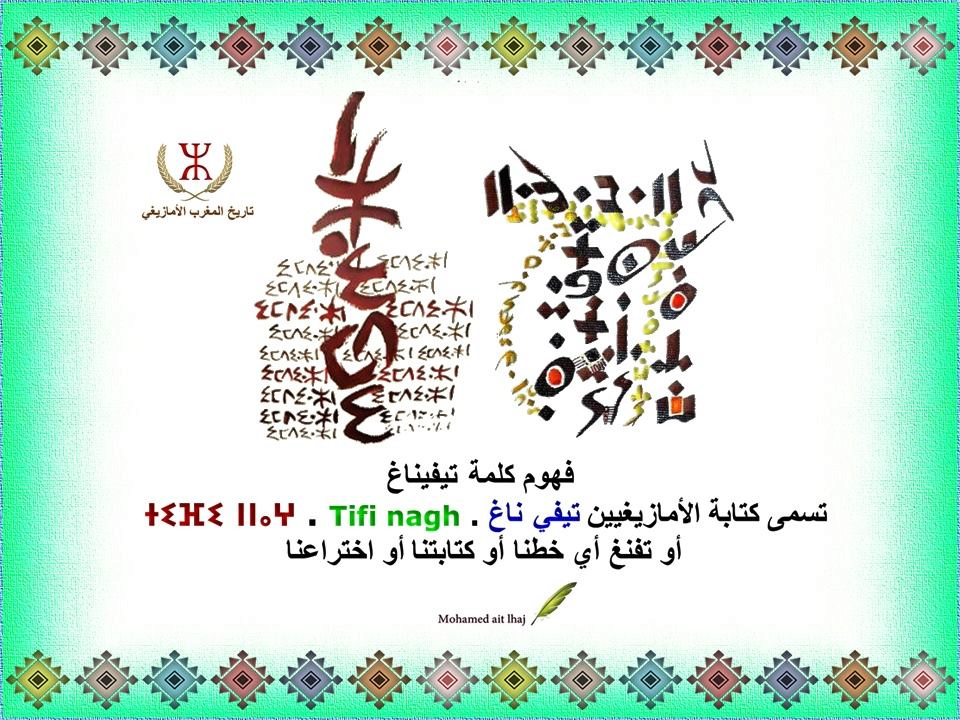!November 19 is Tifinagh letter day

?But what do you know about him
There are 7,000 living languages in the world, most of which are oral languages. Among these thousands of languages, only 50 languages have their own letters, Tifinagh being one of them, “as the official letter for writing the Amazigh language.” Hence the importance of this letter...
What is "Tifinagh"? It is an Amazigh word composed of two parts: "Tifi", which means innovation, invention, or design, and "Ng", which means "our". Thus, Tifinagh means our innovation, design, or invention....
The Tifinagh letters appeared in North Africa, as suggested to us by rock engravings throughout the geography of North Africa, around 5000 years BC or more, so they are 7000 years old now. Thus, they are considered among the oldest alphabets in history, alongside Hebrew and Egyptian, and perhaps the oldest of them all, as suggested by the two archaeological scholars. Matthews and Deka, through the analysis of these rock inscriptions with carbon acid 14, specific to the Tassili site in Algeria. Thus, the Amazigh language is superior in writing to the Greek language by about 1000 years and to the Phoenician language by about 2000 years.
Tifinagh is a local indigenous letter that appeared and developed in its original homeland in North Africa until it reached what it is today.. (New Tifinagh_Erkam)

The Greeks called them the Libyan letters, the Egyptians called them the Libyan letters, the Romans called them the Berber letters, while the Berbers called them the Tifinagh letters.
Before 10,000 years BC, the Berbers relied on animal engravings and some symbols as encrypted messages, either for communication, religious rituals, or as an expression of the environment in which they lived and everything that existed and coexisted with their environmental surroundings, but after the appearance of the Tifinagh letters, they became the place of animal drawings and spread throughout North Africa. Sign boards were used to indicate to nomads and travelers the locations of water, game for hunting, grass, warnings, or expressions of different feelings, messages, and so on.
During the period of the emergence of education in North Africa, such as primary and university education, Greek sources and some excavations, especially at the University of Cyrene in northeastern Libya, indicate that the written Berber language was present and strong, and the Berbers did not know anything else, except that after the expansion of Carthage along the Mediterranean coast in the south and north, a new language appeared, which is the so-called language. "Punic" became the language of ancient world trade. After the Roman invasion and complete control over the northern half of North Africa and the Vandal, Byzantine, and Islamic invasions, Berber writing disappeared and was replaced by Punic, Latin, and Arabic. It moved from writing on tablets, skins, and rocks to carpets, walls, clothes, and tattoos. That is, its confinement remained only in What is cultural, customs and traditions...

However, “the country of the Tuareg” has preserved it in writing and written communication for thousands of years until today, due to the fact that their region has not been subjected to any cultural or linguistic invasion or the obliteration of their authentic Amazigh identity thanks to their isolation in the desert. “Thanks to them, the written Amazigh language has once again returned to the forefront,” and the voice of the Amazigh and the Amazigh movement began in all parts of the world. North Africa is strongly calling and demanding its demarcation, and this has been accompanied by a scientific momentum to revive the letter and its content so that it returns to what it was thousands of years ago. Thus, the Kingdom of Morocco hastened to demarcate the Tifinagh letter in 2003 and demarcate the Amazigh language in 2011, and open the people to the Amazigh language in universities like other international languages...
In Algeria, despite the demarcation of the Amazigh language in 2016, the letter Tifinagh has not yet been written, and one day Tifinagh will have a great importance and say to the world #Here I am, I have not died yet..
Even though they united against me to kill me and banish me forever, as long as there are “my children” in whom the blood of their ancestors flows, I will live again, and just as I invaded the world of the Internet, Facebook, Windows, programs and media screens, I will invade all fields and I will grow taller to return to my glories as I was before, even if my enemies and disbelievers hate it...
tanemmirt

